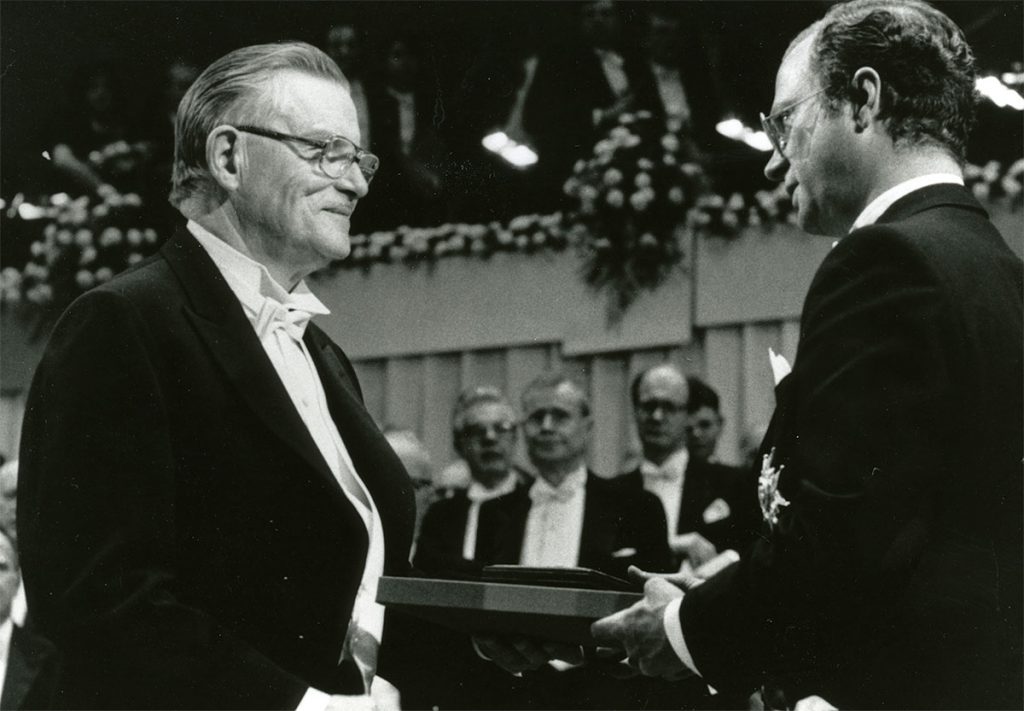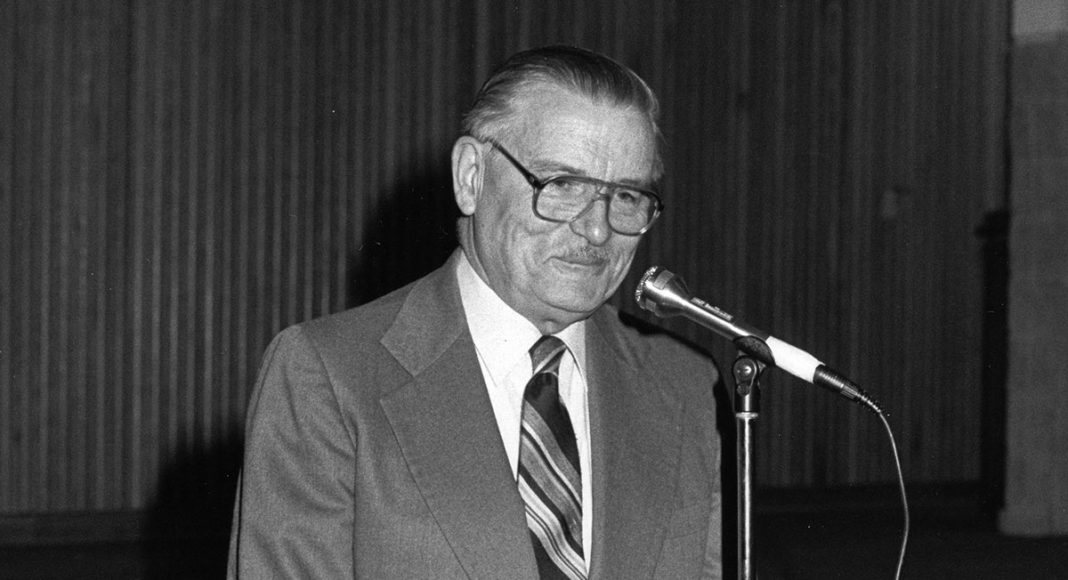James Buchanan, one of the most influential economists of the twentieth century, believed that individuals were able to voluntarily devise private and market-like institutional arrangements to solve problems of public goods and externalities. Why was he so optimistic?
Editor’s note: The current debate in economics seems to lack a historical perspective. To try to address this deficiency, we decided to launch a Sunday column on ProMarket focusing on the historical dimension of economic ideas. You can read all of the pieces in the series here.
James M. Buchanan, the 1986 Nobel laureate in economics and one of the most influential economists of the twentieth century, was a pro-market economist who nonetheless admitted that markets failed to deal with public goods, public bads, and externalities. Such failures should not, however, mechanically lead to government intervention. Partly because governments are flawed themselves but also, Buchanan claimed, because market mechanisms work when markets do not. The failure of markets does not mean the failure of any decentralized, private, or market-like mechanism. Individuals can voluntarily devise private institutional arrangements to solve problems of public goods, public bads, and externalities.
Public Goods, Public bads, Externalities, and the Government
It was in the early-mid 1950s that James Meade and Paul Samuelson started to formally analyze a set of problems that received a name—market failures—in 1958, when MIT professor Francis Bator stressed “the failure of a … system of price-market institutions to sustain ‘desirable’ activities or to estop ‘undesirable’ activities.” This referred to the incapacity of markets to deal efficiently with public goods, public bads, or externalities.
Public goods—swimming pools, movie theaters, highways, etc.—can be consumed by a large number of individuals at the same time. Similarly, many individuals can simultaneously suffer from public bads such as noise, fine particles and toxic fumes, viral diseases, or social disorder. Once they exist, these commodities are available in the same amount to all. However, only some of them can be consumed exclusively by those who have directly paid for them—for instance through a toll, membership or entrance fee, or a fine. Exclusion is sometimes impossible, as with radioactive clouds or nuclear missiles.
Since none of these commodities are free, one may wonder how to cover the costs implied by their provision or avoidance. Can we let individuals decide how much they want to pay? Will they contribute in proportion to the pleasure or profit they get, or the pain and loss that they suffer? Will these contributions be enough to cover the costs of provision of the good or elimination of the bad?
Alternatively, another way of looking at the problem is by considering that using or producing such public goods or bads generates effects on others—externalities. Building a swimming-pool or a highway generates positive external effects, as does being vaccinated or abiding the law. Driving cars or trucks pollutes, giving birth to negative externalities. Similar questions arise: Would individuals take into account the effects of others in their decisions to build or consume the commodity? And would they agree to pay for these effects?
The answer to the above would be “No,” according to (most) economists and even regulators. Individuals always narrowly follow their self-interest and free ride whenever they can. They always try to pay less than the price that corresponds to their preferences and ignore the external and socially undesirable effects of their actions. Decentralized mechanisms that rely on individuals, including markets, cannot be trusted to produce the optimal amount of public good, or optimally prevent public bads or negative externalities. Since markets fail, government intervention is inevitable. Market failures must be cured by government intervention. Buchanan disagreed.
Choosing Which Problems to Solve
Buchanan did not deny that toxic smoke could pour out of certain chimneys, or that traffic could become congested. However, he insisted, this was not what economists should focus on. Economists, he argued, should not start with the objective phenomena they could observe but with what individuals want, with their willingness to act collectively to deal with the problems raised by public goods, public bads, or externalities.

To understand the originality of Buchanan’s views, one must go back to an implicit assumption made by standard economics: market failures and government intervention are given by the physical properties of certain phenomena. Indeed, a rivalry between consumers can be measured and quantified, exclusion is physically or technically possible or not, pollution levels can be measured, etc. Whenever any of these problems is observed, markets can be expected to fail and government intervention will be required.
From this perspective, one could not but admit that there were objective problems that did not call for collective action. That was the case when the expected benefits from acting to produce a public good or remove a nuisance are not strong enough to create a desire to act. No gain would result from engaging in a transaction with others to deal with the problems then faced. Individuals are then not willing to deal with them. Or, put differently, these situations are not viewed as problematic. Government intervention is irrelevant, as any collective action would be.
The only problems for which a collective action was required were those for which potential gains from trade exist. For instance, if the amount individuals are willing to pay is greater or equal to costs of provision of a public good. Or, when the sum the victim of an externality is ready to pay to compensate the person or firm generating the externality in exchange for the agreement to reduce the activity is greater than the loss the latter incurs. In such cases, there is room for collective action—that is, for finding a way of sharing resources and splitting costs among users to provide a public good, or a scheme to compensate a polluter or a victim of pollution. Which means that individuals would always find and implement a solution to a problem of external effects, of a public good or bad.
The above shows how much Buchanan’s perspective was different from the standard economists’ views on market failures and government intervention. In his view, only a fraction the objective problems raised by public goods and public bads should be viewed as problematic—only those individuals were willing to deal with—but, for this very reason, the problems would be solved privately and voluntarily, and without government intervention.
“Buchanan did not deny that toxic smoke could pour out of certain chimneys, or that traffic could become congested. However, he insisted, this was not what economists should focus on.”
Buchanan’s Confidence in Individuals
Buchanan’s clearly optimistic views rested on a confidence in individuals that changed over the years but never disappeared. In the 1950s, he was convinced that individuals would not free ride at all. In his first works in public finance, following the works of the Swedish economist Knut Wicksell, Buchanan developed a voluntary exchange theory of the state. Even if narrowly self-interested, individuals pay taxes for the public goods and services they buy as they do for private goods: if and because, they benefit from consuming the public goods and services provided by the State.
Progressively, and partly under the influence of economists like Richard Musgrave and Paul Samuelson, for whom free riding was a major issue, Buchanan admitted that narrowly self-interested individuals might try to benefit from public goods without paying for them or ignore the externalities their actions generate. But, confident in human beings, which is rare among economists, Buchanan remained convinced that individuals could also adopt a “moral”—Kantian—rule of action, see themselves as members of a group, rather than as isolated individuals, and therefore cooperate with others, contribute to the provision of public goods, internalize the external effects of their actions. At the end of a particularly troubled decade—the 1970s—, Buchanan did not hesitate to write:
“I want only to recognize the existence of a general motive force that inhibits the play of narrowly defined self- interest when an individual recognizes himself to be a member of a group of other-s more or less like himself.”
Buchanan linked the choice between narrow self-interest and moral behavior to each individuals’ predictions of others’ behaviors, which relate to the influence each is expected to have. An individual will behave morally, and cooperate, if she predicts that others will behave morally as a result of her action. From this perspective, the larger the number of individuals involved in the problem, the lower the probability that one individual influences the behavior of others, and the more self-interested the behavior will be. In small groups, by contrast, aware of the influence that they have on others, individuals behave morally—at least most of the time. Non-moral behaviors, as unlikely as they are, remain possible in small groups. This should be prevented. Rules should be devised to guarantee the exclusion of free riders from the group and, accordingly, from benefits of collective action. Groups need a constitution to function correctly.
Thus, according to Buchanan, in such groups, collective action can be expected to spontaneously emerge and market failures can be predicted to be dealt with voluntarily by the individuals themselves.

Federalism for a Greater Society
Organizing society around small and cohesive groups in which individuals behave morally was, in Buchanan’s view, a first and necessary step. Then, to allow cooperation among and across groups, to deal with the goods and bads that transcended the frontiers of small groups or that cannot be dealt within small groups such as large-scale pollution or the provision of public goods for which no exclusion at all is possible, cooperative agreements could be devised. A broad and encompassing social contract, or constitution, would tie all these groups together. This meant a federal regime in which local problems were dealt with locally, and other problems were dealt with through constitutional agreements between these groups.
A Lesson for the 21st Century
Buchanan believed that individuals should be trusted to find ways to deal with genuine problems since he started his career, refining his view unremittingly. This is worth reminding, partly to do justice to the subtlety of Buchanan’s work, and also because this is what can be observed in the real world: individuals do cooperate when they are in the right environment. Buchanan anticipated and echoed the empirical findings of another tireless defender of individuals and decentralized mechanisms and a Nobel laureate in economics, Elinor Ostrom. Indeed, collective action has not necessarily to be initiated by the government. And markets or market mechanisms should not be confused with unrestrained and cutthroat competition.






